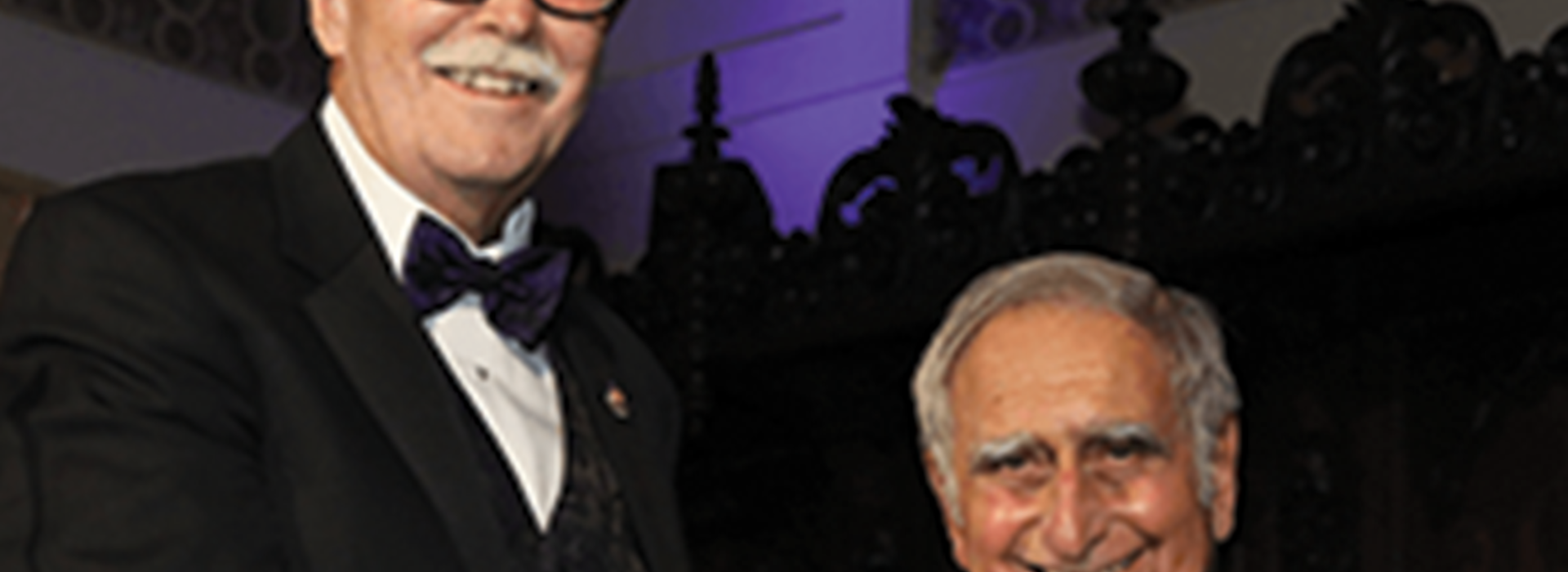
UMN Surgeon Dr. Henry Buchwald Receives the Jacobson Innovation Award of the American College of Surgeons
Surgeon, researcher, inventor, teacher and mentor Henry Buchwald, MD, PhD, (professor in the Department of Surgery) was honored with the prestigious international Jacobson Innovation Award for his life-long pioneering work and innovative research in metabolic/bariatric surgery.
The award, bestowed by the American College of Surgeons (ACS) to living surgeons who have developed life-changing surgical advances, recognized Buchwald as “a true surgeon-scientist who, through creativity and perseverance, has made seminal contributions to science and society.”
Renowned for his surgical innovations, Buchwald discovered that the ileum, part of the small intestine, is the primary site for the absorption of cholesterol and bile acids. The discovery led to the development of the Buchwald Procedure: the partial ileal bypass (PIB) operation, which bypasses part of the ileum to lower cholesterol levels. The PIB procedure was one of the first surgical techniques to treat metabolic disease and remains today the most potent therapy to lower plasma cholesterol levels in humans.
Buchwald is also an accomplished researcher. His landmark paper in Circulation led to the largest National Institutes of Health ($60M) multi-institutional trial on the surgical management of hyperlipidemias – Program on the Surgical Control of Hyperlipidemias (POSCH). The trial received continuous funding from the National Institutes of Health (NIH) from 1973-1977, proving the link between cholesterol and heart disease, demonstrating that lowering cholesterol can reduce heart disease and save lives.
He is also a professor of biomedical engineering, credited with 20 patents from his work developing implantable medical devices. His bioengineering laboratory is credited with developing the first implantable infusion pump, a novel peritoneovenous shunt, one-way flow catheters, and other devices. The infusion pump was later patented for widespread use in insulin delivery, continuous delivery of chemotherapy, and further applications.
Buchwald became inspired to study metabolic surgery and obesity in the context of other basic research being done at the University of Minnesota. Specifically, Ancel Keys, a scientist known for his starvation studies and development of the K-ration during World War II, established its link between cholesterol and heart disease during the 1950s.
Early in his career, while he was a surgery laboratory resident, legendary surgeon Owen H. Wangensteen, MD, who chaired the Department of Surgery at the Medical School from 1930-1967, asked Buchwald to join his laboratory. Dr. Buchwald declined the offer expressing his interest instead in the study of cholesterol metabolism. Buchwald explains that “in the Wangensteen atmosphere, you could come up with ideas.” “Wangensteen asked what I was interested in (cholesterol metabolism) and thought it sounded interesting,” says Buchwald. With support and financing in hand from Wangensteen, Buchwald embarked on a career at the University of Minnesota spanning more than half a century of groundbreaking surgical work and innovative research.
About Henry Buchwald, MD, PhD, FACS, FRCSEng(Hon)
Originally from Austria, Buchwald and his mother fled the Nazi Anschluss in 1938, eventually settling in the United States. He earned a bachelor’s degree at Columbia College in New York in 1954, and in 1957 earned a medical doctorate (MD) at the College of Physicians and Surgeons, Columbia University, graduating from both institutions at the top of his class. He completed an internship at the Columbia-Presbyterian Hospital in New York City and then spent two years as Chief Flight Surgeon, SAC, in the U.S. Air Force.
Since 1960, he has studied, worked, taught, and researched at the University of Minnesota, where he completed his residency training and also earned a master of science in biochemistry and PhD in surgery. Dr. Buchwald trained with Richard L. Varco, MD, FACS, one of the fathers of bariatric surgery who performed the first obesity surgery in 1953, and Owen H. Wangensteen, MD, PhD, FACS, recognized by the ACS as one of the greatest surgical educators of the 20th century.
In 1966, Dr. Buchwald joined the faculty of the University of Minnesota and today serves as professor of surgery and biomedical engineering. He was also appointed as the first Owen H. and Sarah Davidson Wangensteen Chair in Experimental Surgery.
About the American College of Surgeons
The American College of Surgeons is a scientific and educational organization of surgeons founded in 1913 to raise the standards of surgical practice and improve the quality of care for surgical patients. The College is dedicated to the ethical and competent practice of surgery. Its achievements have significantly influenced the course of scientific surgery in America and have established it as an important advocate for all surgical patients. The College has more than 82,000 members and is the largest organization of surgeons in the world. For more information, visit www.facs.org.